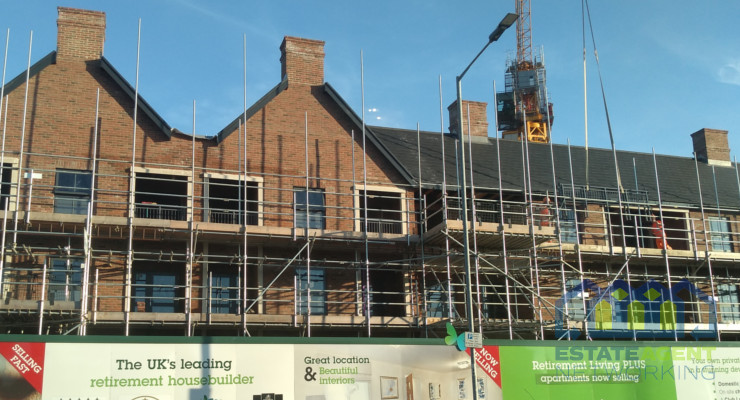UK’s Housing Crisis Deepens as 1.4 Million Homes Sit Unbuilt
February 17, 2025
Cornerstone Tax reveals that 19% of tenants have been forced to move five times in less than five years due to landlords exiting the market
David Hannah, Group Chairman of Cornerstone Tax, urges the government to focus on addressing the wider housing affordability crisis by incentivising landlords
The government’s plan to develop 12 new towns is set to rely significantly on corporate landlords to meet its ambitious housing targets, with build-to-rent homes expected to comprise up to a quarter of the total properties. Each new town will feature at least 10,000 homes, and the growing shift towards build-to-rent is driven by developers prioritising long-term rental income over high sale prices, which are increasingly constrained by buyer affordability.
As the build-to-rent sector sustains its growth, doubling in size since 2021 and reaching 110,000 completed units, this could offer a viable alternative to the traditional housing market, which continues to face significant challenges. However, as 1.4 million approved homes left unbuilt, David Hannah, Group Chairman of Cornerstone Tax, calls on the government to reconsider its housing reforms and provide serious incentives for landlords to remain in the market.
David highlights how a record number of landlords are leaving the rental market, contributing to serious issue of supply and demand within the UK. Cornerstone’s research reveals that 19% of tenants have had to change rental properties five times in less than five years through no fault of their own as landlords are forced to either exit the market or pass on these record high mortgage costs onto their tenants. Moreover, as demand continues to outstrip supply within the market, 17% of tenants have also admitted that they have lost out on a property that they wanted to rent in the last two years due to a bidding war.
David also emphasises that the UK government has missed key opportunities to tackle the country’s growing housing crisis. These include failing to reduce the second home surcharge to, decreasing stamp duty thresholds, and not reinstating Multiple Dwellings Relief. Exclusive data from Cornerstone Tax further underscores the impact of these stamp duty reforms, revealing that 26% of Brits already aren’t unable to purchase property due to unaffordable stamp duty costs. Meanwhile, 15% of landlords are considering selling due to rising expenses, and 18% of prospective buy-to-let investors have been deterred by increasingly complex regulations.
Group Chairman of Cornerstone Tax, David Hannah comments:
“This year, the government must urgently recognise the ever-pressing need for drastic changes to the housing market. The previous government’s decision to abolish Multiple Dwellings Relief (MDR) was beyond counterproductive and will result in fewer new homes being built, with a significant drop in both domestic and overseas investment into housing delivery.
“By removing a critical tax break such as MDR and failing to incentivise landlords who are fleeing the market, the government’s refusal to reverse these policies undermines the build-to-rent sector, which relies heavily on such incentives to maintain and expand the housing supply. Furthermore, the increase in the second home surcharge and Stamp Duty thresholds reforms will not only reduce the stock of homes in the UK, but will make it harder for first-time buyers to get onto the property ladder.
“New policies need to promote affordability, accessibility and support for businesses building in Britain. The government must now listen to property firms and industry stakeholders to solve this vitally discouraging situation for Brits, otherwise this crisis will continue to cause chaos for years to come.”
You May Also Enjoy
First-time buyer reform could reshape conveyancing risk landscape
The Government’s consultation on replacing the Lifetime ISA with a new first-time buyer savings product by April 2028, and review of the £450,000 property price cap, could have significant legal and transactional implications for buyers and property professionals alike. According to Beswicks Legal, the reform is a live conveyancing risk issue already affecting transactions on…
Read More Property Redress reports Complaint enquiries rise 47%
Complaint enquiries rise 47% as Property Redress annual report shows faster resolutions and higher early settlements 47% increase in complaint enquiries in 2025 (4,220 vs 2,863 in 2024) 41% more cases accepted by December compared to the previous year Average resolution time reduced to 34 days (down from 39 days in 2024) 53% of cases resolved at early…
Read More Breaking Property News 2/3/26
Daily bite-sized proptech and property news in partnership with Proptech-X. Rightmove’s CEO Johan Svanstrom … ‘is a man under pressure’ Rightmove’s ‘Unthinkable Event’ Thought Leadership by Mal McCallion CEO at ModelProp, guiding AI-driven growth in property. The #Rightmove CEO came out swinging on Friday when his company’s latest set of annual results, for 2025, showed that they…
Read More Bank of England Money and Credit Report – January 2026
Overview These monthly statistics on the amount of, and interest rates on, borrowing and deposits by households and businesses are used by the Bank’s policy committees to understand economic trends and developments in the UK banking system. Key points: et borrowing of mortgage debt by individuals decreased to £4.1 billion in January, from £4.5 billion…
Read More Nationwide house prices showing a 0.3% increase
Thoughts from the Industry Nathan Emerson, CEO of Propertymark comments: “Today’s figures from Nationwide show continued upward movement in house prices, reflecting resilient demand in many parts of the UK despite ongoing affordability constraints. “While rising prices may signal confidence in the market, they also reinforce the need for policies that support supply and improve…
Read More House price growth holds steady in February
Annual house price growth unchanged at 1.0% House prices were up 0.3% month on month Continued improvement in affordability helped drive first-time buyer activity in 2025 Commenting on the figures, Robert Gardner, Nationwide’s Chief Economist, said: “Annual house price growth remained steady at 1.0% in February. Prices increased by 0.3% month on month, after taking…
Read More 








